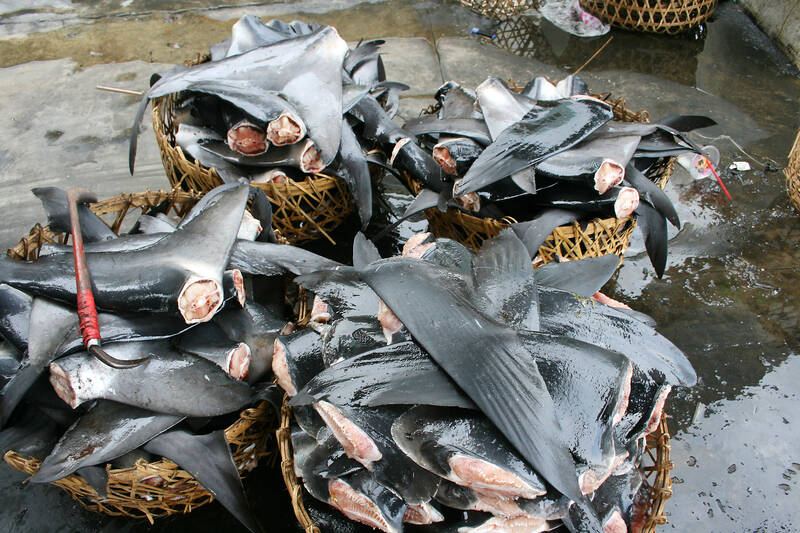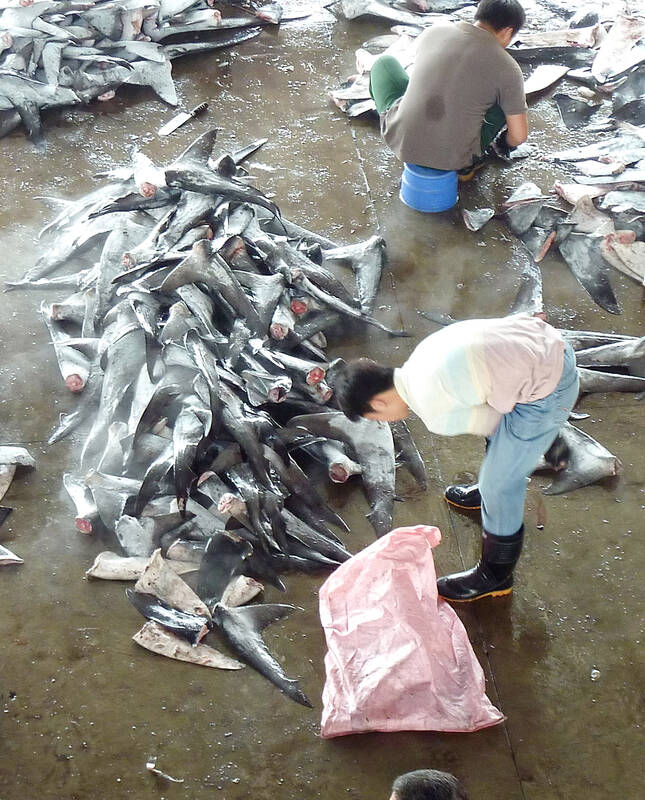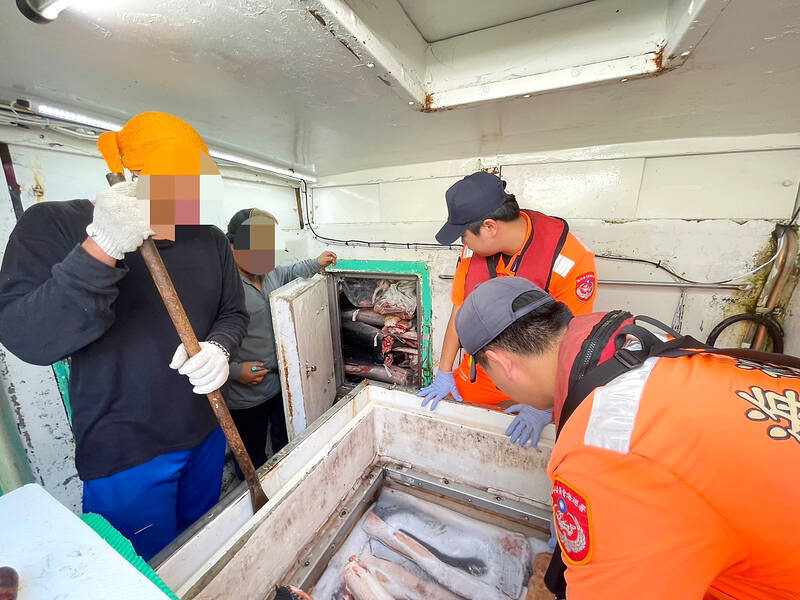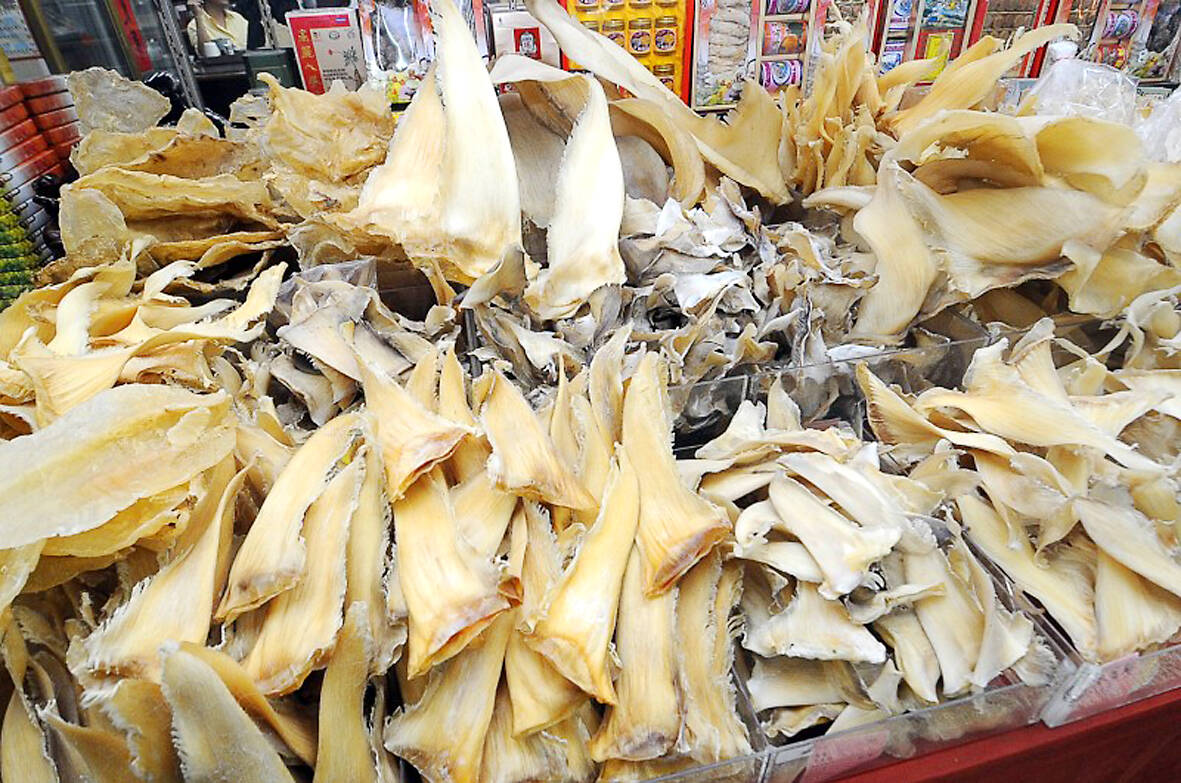Some people are afraid of sharks, but sharks have a good reason to fear humans even more.
Throughout the world last year, there were just 69 confirmed unprovoked shark attacks on people, and a mere 14 fatalities. By contrast, it’s estimated that humans kill between 80 million and 100 million sharks each year, with a quarter of those deaths representing threatened species.
On July 13 last year, The Conversation reported that “71 percent of oceanic shark and ray populations have been depleted in the last half-century and one third of all 1,199 shark and ray species are now threatened with extinction… primarily due to overfishing.”

Photocourtesy of the Environment and Animal Society of Taiwan
When shark numbers decline, populations of larger predatory fish grow. The latter feed on herbivores, and fewer herbivores mean more macroalgae. That’s bad news for corals, which means it’s also detrimental for marine species that shelter and spawn around reefs, as well as the humans who eat them.
Taiwan outlawed finning in 2013. This cruel, wasteful, and environmentally destructive practice involves catching sharks, cutting off the fins for which gourmands pay top dollar, then throwing the fish back into the sea where they suffocate or die from blood loss. For fishermen, it’s a matter of simple arithmetic. Because a metric ton of shark fins is worth much more than other cuts of shark, some Taiwanese fishing vessels still break the law.

Photocourtesy of the Environment and Animal Society of Taiwan
RECENT OFFENSES
On June 16, 6,510.6kg of shark fins were found concealed aboard a ship arriving at Nanfangao Fishing Port (南方澳漁港) in Yilan County. According to a June 19 report in the Liberty Times (the Taipei Times’s Chinese-language sister newspaper), the Jin Maan Fa No. 66 had been at sea since Feb. 27. During its voyage, the Environment and Animal Society of Taiwan (EAST) estimates from the quantity of fins discovered, the boat killed between 2,000 and 3,000 sharks.
Taiwan’s current fishing regulations allow boats to fish for sharks in the Pacific so long as the bodies and fins are landed at the same time, and the fins don’t exceed more than 5 percent of the total catch by weight. If the fin isn’t attached to the fish it came from, it must be in the same bag as the carcass or tied to it.

Photo courtesy of the Coast Guard
The London-based Environmental Justice Foundation (EJF) points out that, while these requirements are designed to stop fishing crews from disposing of vast numbers of shark bodies, they’re “costly and difficult to enforce, as each shipment of fins and bodies must be weighed at port inspections.”
The Jin Maan Fa No. 66 has a history of breaking Taiwan’s law against finning. In 2021, after the ship’s crew were found to have cut off fins and discarded shark carcasses, its operator was fined NT$5 million. The crew were given fines totaling NT$600,000, and everyone involved had their licenses suspended for 16 months.
They’re not the only ones who’ve contravened the law. On Nov. 14 last year, the operator and crew of the Shin Shyang Yih No. 6 were fined NT$500,000 and NT$100,000, respectively, for failing to follow regulations governing the catching and handling of shark fins. Among other fisheries entrepreneurs penalized last year were the operators of the Maan Yih No. 270 (fined NT$2.1 million for falsifying shark-catch data) and of the Chyuan Shenq No. 226 (NT$1.9 million for “not handling shark catches in accordance with regulations”).

Photo: Taipei Times, file photo
According to an investigation by Chinese-language online media The Reporter, published Feb. 1, 2021, of the 81 fines imposed by Taiwan’s government for illegal fishing between 2017 and 2020, 54 (totaling NT$73.65 million) were related to catching sharks.
It’s unclear how much profit the operator of the Jin Maan Fa No. 66 would’ve made if he’d found a buyer without alerting the authorities, but it’s obvious that the current system fails to deter some fishermen from finning or from catching protected shark species.
Rather than demanding even stiffer fines, EAST is calling on Taiwan’s government to amend the Act for Distant Water Fisheries (遠洋漁業條例), so as to enforce a zero tolerance policy for shark finning and ensure that first-time violators lose their licenses for good.
In a letter co-signed by the EJF and eight other NGOs, EAST points out that the law currently stipulates that a vessel must commit the same offense three times, or twice within 12 months, before its operating license or its crew’s certificates can be permanently revoked. So long as any fines are paid and suspensions served, Jin Maan Fa No. 66 may yet return to the Pacific Ocean.
EAST Deputy Chief Executive Chen Yu-min (陳玉敏) praises the US and the EU as jurisdictions that have taken effective action against finning.
The Shark Fin Sales Elimination Act of 2021 bans the sale, purchase and possession of shark fins throughout the US.
“This federal legislation effectively prohibits any commercial activity involving shark fins, regardless of whether the fins were obtained by finning or another method. The only exception to the rules is for the smooth dogfish (Mustelus canis),” Chen says.
The sale and consumption of meat from non-endangered shark species remains legal in the US, as it is in Taiwan.
The EU’s stance against shark finning dates back to 2003, when it banned EU-flagged vessels from engaging in it anywhere in the world, and prohibited the practice on all vessels fishing within EU waters.
The Shark Fins Act, which became law in the UK last summer, bans the import and export of detached shark fins, including products such as tinned shark fin soup. At the other end of the conservation spectrum, China, India and Indonesia still permit finning.
DAMPENING DEMAND
During his 2000 to 2008 term as Taiwan’s president, Chen Shui-bian (陳水扁) ordered that government-sponsored feasts shouldn’t feature shark fin (or abalone, which is threatened with extinction due to overfishing and ocean acidification). And recognizing that there would be no finning if diners weren’t keen on shark fin soup — a traditional banquet dish in Taiwan — EAST has endeavored to educate local consumers.
More than a decade ago, EAST, working with other groups, successfully lobbied the Grand Hotel to stop serving shark fin dishes at its restaurants.
“In 2010, along with 23 civil society groups, we called on Taiwan’s four major convenience store chains to stop the sale of Lunar New Year shark fin dishes. In 2011, they removed them from their menus,” Chen says.
There’s anecdotal evidence that shark fin is less popular than it once was, yet domestic demand remains significant. Fisheries and import-export statistics suggest at least 700 metric tons of fins, possibly representing a quarter of a million sharks, are consumed in Taiwan each year. That’s not including undeclared shipments like the one found on the Jin Maan Fa No. 66 — and nobody knows how many of those there are.
Steven Crook, the author or co-author of four books about Taiwan, has been following environmental issues since he arrived in the country in 1991. He drives a hybrid and carries his own chopsticks. The views expressed here are his own.

With one week left until election day, the drama is high in the race for the Chinese Nationalist Party (KMT) chair. The race is still potentially wide open between the three frontrunners. The most accurate poll is done by Apollo Survey & Research Co (艾普羅民調公司), which was conducted a week and a half ago with two-thirds of the respondents party members, who are the only ones eligible to vote. For details on the candidates, check the Oct. 4 edition of this column, “A look at the KMT chair candidates” on page 12. The popular frontrunner was 56-year-old Cheng Li-wun (鄭麗文)

“How China Threatens to Force Taiwan Into a Total Blackout” screamed a Wall Street Journal (WSJ) headline last week, yet another of the endless clickbait examples of the energy threat via blockade that doesn’t exist. Since the headline is recycled, I will recycle the rebuttal: once industrial power demand collapses (there’s a blockade so trade is gone, remember?) “a handful of shops and factories could run for months on coal and renewables, as Ko Yun-ling (柯昀伶) and Chao Chia-wei (趙家緯) pointed out in a piece at Taiwan Insight earlier this year.” Sadly, the existence of these facts will not stop the

Oct. 13 to Oct. 19 When ordered to resign from her teaching position in June 1928 due to her husband’s anti-colonial activities, Lin Shih-hao (林氏好) refused to back down. The next day, she still showed up at Tainan Second Preschool, where she was warned that she would be fired if she didn’t comply. Lin continued to ignore the orders and was eventually let go without severance — even losing her pay for that month. Rather than despairing, she found a non-government job and even joined her husband Lu Ping-ting’s (盧丙丁) non-violent resistance and labor rights movements. When the government’s 1931 crackdown

The first Monopoly set I ever owned was the one everyone had — the classic edition with Mr Monopoly on the box. I bought it as a souvenir on holiday in my 30s. Twenty-five years later, I’ve got thousands of boxes stacked away in a warehouse, four Guinness World Records and have made several TV appearances. When Guinness visited my warehouse last year, they spent a whole day counting my collection. By the end, they confirmed I had 4,379 different sets. That was the fourth time I’d broken the record. There are many variants of Monopoly, and countries and businesses are constantly